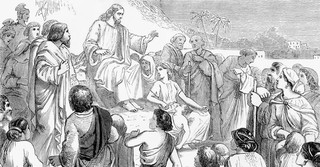Is John's Gospel History or Theology?
Share

Over the years, biblical scholars have challenged the historicity of the canonical gospels on a number of fronts. But no gospel has taken it on the chin like the Gospel of John. Ever since Clement of Alexandria’s famous statement that the gospel of John was “a spiritual Gospel” (recorded in Eusebius, Hist. eccl. 6.14.7) critics have suggested that John has very little to do with history and has much more to do with theology.
The reasons for such critiques of John are not difficult to find. John writes the story of Jesus in a lengthy, drawn-out style (quite different than the pithy language of the Synoptics), he includes unique events (e.g., the man born blind, raising Lazarus from the dead), and, most of all, he highlights the divinity and pre-existence of Jesus (“In the beginning was the Word”).
If you want to know about the Jesus of history, the gospel of John, we are told, is not the place to go.
But is it really true that John is more theology than history? In 2007, Richard Bauckham published an article in NTS entitled, “Historiographical Characteristics of the Gospel of John,” which answers precisely this question. In my opinion, Bauckham’s article has not received the attention it deserves.
In his article, Bauckham argues that John bears certain characteristics that his readers would have understood as historiographical—meaning they would have understood it to be a work of history. And these characteristics are actually more prominent in John than in the Synoptics.
Let me just mention three of them.
Photo Courtesy: Prateek Katyal/Unsplash
Topography/Geography

John exhibits impressive knowledge of the places where the events of Jesus’ life took place. John’s numerous geographical references have been tested and found to be very accurate. But even more than this, John is often much more specific than the Synoptics. He adds a layer of detail and precision that does not occur as often in the other three gospels, which tend to be more general in their geographical references.
Photo Courtesy: Pexels
Eyewitness Testimony

In the ancient world, good history was eyewitness history. For a historical account to be credible, a historian either needed to have witnessed the events himself, or he needed to have received his information from someone who did witness those events. Here, the Gospel of John stands out because it expressly claims to have been written by the “beloved disciple” (21:24) who was an eyewitness from the beginning (1:35-40) and present at the last supper (13:23).
Photo Courtesy: Lightstock
Length of Discourses

While scholars suggest that John’s gospel must be embellished because the discourses are so much longer than the Synoptics, Bauckham makes almost the opposite point, namely that the Synoptics are more likely abbreviated versions of longer speeches. The Synoptic gospels give evidence of being summaries or condensed version of Jesus’ actual teachings (they are not for this reason unreliable; this was just what historians sometimes had to do). This leads to the rather surprising reality that John’s lengthy discourses are, historically speaking, more realistic than the Synoptics. They capture more accurately what Jesus would have probably sounded like.
Photo Courtesy: Lightstock
Conclusion

All of these considerations leave us with a rather counter-intuitive conclusion—at least from the perspective of modern critical scholarship—namely that John’s gospel actually contains clearer historiographical credentials than the Synoptics. After all the hits that John’s gospel has taken over the years, this is remarkable fact.
It is a reminder, once again, that the “consensus” of the academy has its limitations. Indeed, sometimes the truth lies in the opposite direction. Thus, when it comes to John’s gospel, one can truly say, “The last will be first, and the first will be last.”
For more, visit Dr. Kruger's website: Canon Fodder.
Editor's Note: This article has been adapted from "Is the Gospel of John History or Theology," found here.
Photo Courtesy: Lightstock